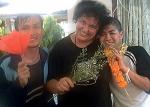Power To The People
It is ironic that people who suffer from the worst oppression seem to be the most able to thrive and “find themselves and their calling,” a woman friend from Iran recently said to me as we were discussing the release of Haleh Esfandier, the Iranian American who was recently released after 7 months in jail in Iran. And there is Sharon Ebadi, the Iranian attorney who has been incarcerated for defending over 200 jailed journalists and received the Nobel Peace Prize in 2003. Recalling the take-over of a television station by a group of women in Oaxaca last year, I am so proud of the women of the world who are courageously fighting for justice.
But of course, as in Oaxaca, it is usually the destitute that have the least to lose, except for their lives. You won’t see an uprising in the U.S. anytime soon. We have the most to lose…jobs that provide 401Ks destined for retirement and education of our children are more important to us in the short term than holding corrupt leaders accountable. Witness the University of Florida journalism student who was tasered after being handcuffed and removed from a venue where he was vociferously questioning Senator Kerry. See video here. Safer to hold leaders in other countries accountable.
Cambodia
Nuon Chea, the top surviving leader of Cambodia’s notorious Khmer Rouge, whose radical policies were responsible for the deaths of an estimated 1.7 million people, was charged by an International Tribunal Wednesday with crimes against humanity and war crimes.
Nuon Chea, considered the right-hand man to Pol Pot, was arrested early Wednesday morning at his home in Pailin in northwestern Cambodia near the Thai border and flown to the Cambodian capital Phnom Penh, where he was put in the custody of a U.N.-supported genocide tribunal. The late Khmer Rouge leader Pol Pot died in 1998 and his former military chief, Ta Mok, died in 2006 in government custody.
The tribunal is investigating abuses committed when the communist Khmer Rouge held power in 1975-79. The Khmer Rouge have been blamed for the deaths of their countrymen from starvation, ill health, overwork and execution.
Officers later took the 82-year-old Nuon Chea – who denies any wrongdoing – into custody and put him into a car and then a helicopter for the capital, Phnom Penh, as his son and dozens of onlookers gathered to watch the historic scene in silence, witnesses said.
Burma
UPDATE Sunday September 23, 2007
The AP has reported that 20,000 March in Yangon (formerly Rangoon) Myanmar…double the number that marched yesterday in Mandalay.
The monks shouted support for Suu Kyi, while about 10,000 people protected them by forming a human chain along the route but riot police and barbed wire barricades blocked hundreds of monks and anti-government demonstrators from approaching the home of the detained democracy leader Aung San Suu Kyi
Plainclothes police trailed the marchers. Some, armed with shotguns, were posted at street corners. Sunday’s security presence came after several days of a hands-off attitude by the authorities, who had clearly been trying to avoid provoking the well-disciplined and widely respected monks. One observer said “the military is not prepared, unless things get worse, to directly confront the monks in their uniforms but violence on a significant scale is not to be discounted.”
UPDATE Saturday September 22, 2007
London’s Guardian reported that witnesses say that upwards of 10,000 monks marched through the city of Mandalay in the 5th straight day of demonstrations against the iron-fisted military junta, the largest demonstration in a decade.
September 19, 2007
The associated press today reported that the Myanmar monks were taking to the streets for the second day in a row, marching in disciplined ranks as they extended a series of spirited demonstrations against the country’s military government into a second month.
The marches on Tuesday by thousands of monks in Myanmar marked the 19th anniversary of the 1988 crackdown in Myanmar in which the current junta took over after crushing a failed pro-democracy rebellion that sought an end to military rule, imposed since 1962.
The junta held general elections in 1990, but refused to honor the results when pro-democracy leader Aung San Suu Kyi’s National League for Democracy party won. Suu Kyi has been detained under house arrest for more than 11 years.
The Yangon march and rallies in other cities Wednesday were to protest hardship brought on by the government’s economic policies, especially a sudden hike in fuel prices. The hike last month sparked the persistent protests – first by pro-democracy activists and now primarily by monks. The rallies also reflect long pent-up opposition to the repressive military regime.
The authorities know that restraining monks poses a dilemma. Monks are highly respected in predominantly Buddhist Myanmar, and abusing them in any way could cause public outrage.
In addition to protests, monks have threatened to cut off contact with the military and their families, and to refuse alms from them – a humiliating gesture that would embarrass the junta.
Monks have nothing to lose…except their lives.
Tags: Burma, Burma (Myanmar), Cambodia, Myanmar


Leave a Reply